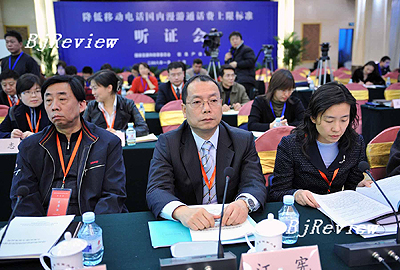|
Hao Jinsong, a lawyer who frequently travels around the country, once had a "money-burning" experience on January 10, 2007. That day, when he was traveling from Taiyuan, Shanxi Province, to Hangzhou, Zhejiang Province, the Ministry of Railways announced that it would not raise train ticket prices during the traffic peak around the Spring Festival anymore. Numerous journalists from all over the country called Hao for an interview, and he had to pay about 1,000 yuan ($138.89) in just 11 hours. "I am now afraid of the roaming fees," he said.
The roaming cost has also long been unknown to consumers. Before the hearing, many consumers requested that it be publicized. According to a report submitted to the representatives before the hearing was held, the average cost per roaming service for China Mobile and China Unicom was 0.0485 yuan in 2006. The report was issued by China Audit Certified Public Accountants.
Service providers said the fees are based on the extra costs incurred when calls have to be transferred from one operator to another. Experts, however, said that new technologies have lowered costs, and some argued that roaming calls actually incur no extra costs for operators.
Lu Wenchang, from China Mobile, argued that his company had reduced call charges by 62.1 percent in the last five years and it was impossible to provide mobile services in such a vast country with no costs.
Ding Ming, from China Unicom, said the maximum roaming service fees should be higher than that of local services as the cost was higher. "Only 2.5 percent of China Unicom's mobile subscribers frequently use roaming services," he said. "That means only a small fraction of our customers can benefit from a fee reduction."

Another consequence of the rate cut may be that it could help them lure users from fixed-line operators such as China Telecom and China Netcom. After the hearing was held on January 22, Zhu Zhengwu from China Telecom said plan B, which would no longer charge subscribers for long distance calls when they were outside home provinces, may lead to people to give up fixed lines and turn to China Mobile for long distance calls.
"The plan could help China Mobile monopolize the market with the substitution of fixed lines with mobile phones, which as a result will hurt the consumers' interests," he warned.
"A lower roaming fee means consumers may switch from fixed lines to mobile phones when they make long-distance calls," said Eric Wen, an analyst for BNP Paribas. "So, China Mobile will stand to benefit, further pushing fixed-line operators (such as China Telecom and China Netcom) to the sidelines."
Customers still not satisfied
The move to cut domestic cell phone roaming service charges has apparently failed to satisfy the public, according to an online poll. Most respondents said the proposed charges were still too high.
Sina.com, one of the country's most popular Web portals, conducted an online survey regarding the rate cut of roaming fees. By February 19, nearly 70,000 respondents had participated and about 83.4 percent of them regarded the roaming fees as "still too high." Just 1.3 percent said they were "low enough," while more than 15.3 percent considered them to be "reasonable."
Service providers said some users actually enjoy free or cheap roaming calls depending on the packages they offered. According to Li Jian, his brother, who now lives in Qingdao, Shandong Province, now pays much less for making and receiving calls outside the local service area. In different packages, the lowest charge for roaming calls is 0.25 yuan ($0.03) per minute, but the minimum consumption amount for using the packages ranges from 88 yuan ($12.22) to 500 yuan ($69.44) per month.
"Cutting the maximum roaming fees is meaningful in just a few places with high cell phone charges, such as Beijing," Li said. | 